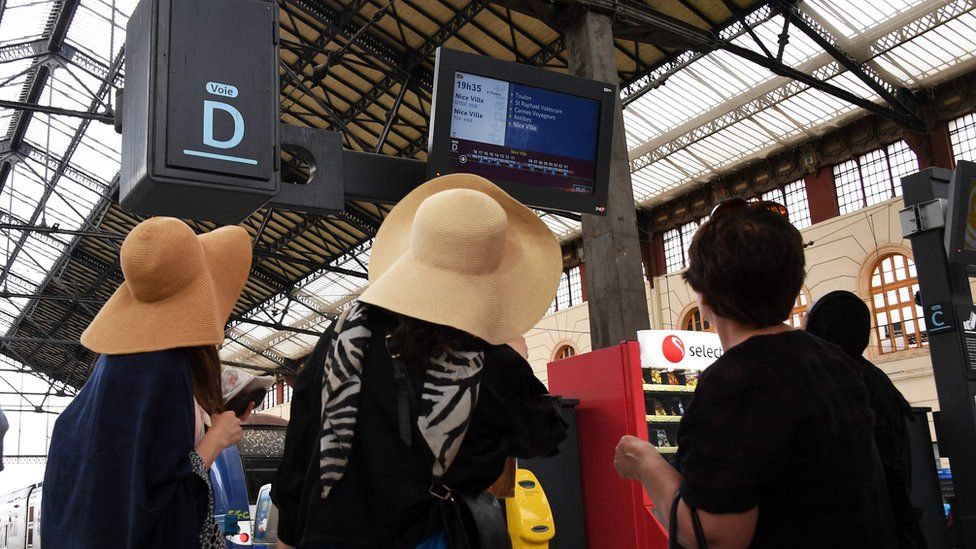France labour dispute: Hollande digs in as rail strike begins
- Published

President Francois Hollande of France has insisted that a controversial labour reform will not be withdrawn as strike action begins on the railways.
"The text assures the best performance for businesses and offers new rights to employees," he told a newspaper.
Protesters clashed with police last week during marches against the bill, which makes hiring and firing easier.
There are concerns the Euro 2016 football championships, which France hosts from next week, may be disrupted.
Tourism chiefs in Paris have warned that the unrest is putting off visitors to one of the world's top destinations.
"The scenes of guerrilla-type action in the middle of Paris, beamed around the world, reinforce the feeling of fear and misunderstanding," the tourist board said.
The capital's reputation as a safe destination was already dented by November's deadly attack by militants from the self-styled Islamic State (IS) group, who killed 130 people in gun and bomb attacks.
Meanwhile, thousands of public sector workers in Belgium are taking part in a 24-hour national strike against budget cuts, changes to working hours and a rise in the retirement age.
Police officers, teachers and some civil servants are joining train drivers and prison guards already on strike.
French labour reform bill - main points
- The 35-hour week remains in place, but as an average. Firms can negotiate with local trade unions on more or fewer hours from week to week, up to a maximum of 46 hours.
- Firms are given greater freedom to reduce pay.
- The law eases conditions for laying off workers, which is strongly regulated in France. It is hoped companies will take on more people if they know they can shed jobs in case of a downturn.
- Employers to get more leeway to negotiate holidays and special leave, such as maternity or for getting married. These are currently also heavily regulated.
The railway strike began at 19:00 local time (17:00 GMT) and was expected to cause widespread travel disruption on national and regional networks on Wednesday.
The Paris Metro is due to go on strike from Thursday, and six of the country's eight oil refineries are still halted or running at reduced capacity due to union action.
Air France pilots have voted to strike for at least six days in June in a separate dispute over productivity targets.
The labour reform, which is aimed at making the labour market more flexible, was pushed through the lower house of parliament without a vote.
A new national day of action is planned by unions for 14 June, when the bill goes to the Senate.
Labour Minister Myriam El Khomri said on Tuesday she was waiting to hear from the CGT, the union leading the action, after hearing that its leader, Philippe Martinez, had called for new talks.
A local CGT leader, Olivier Mateu, called on President Hollande to reconsider the reforms on Tuesday.
"Maybe the government counted on the fact that with the arrival of spring and hot weather the whole country would be asleep?" he said in an interview for the Associated Press news agency.
"There is no shame in political leaders going back on their decision when they have made a mistake, to create the conditions to discuss social progress in this country," the trade unionist added.
What French media are saying: BBC Monitoring
Centre-left Le Monde says the authorities are attempting to "splinter the various fronts" (all links in French) in the strike by making them separate offers.
Ouest France, France's biggest-selling daily, dubs the split between the CGT and CFDT unions as a "union movement cut in two".
Conservative Le Figaro criticises the approach as "saying yes to everything and squandering public money".
Left-wing Liberation calls on both sides to show "good will" and compromise over working hours or else face "falling at the same time" by letting the right win the next elections.
- Published26 May 2016
- Published26 May 2016
- Published25 May 2016
- Published23 May 2016
- Published15 March 2016